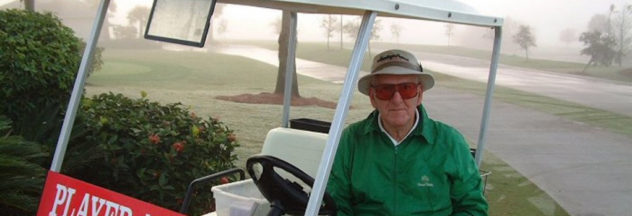I’m a vociferous advocate for fast pace of play on the golf course, and absolutely and unapologetically abhor slow play. Loathe isn’t a strong enough word to adequately convey the vile hatred and low regard in which I hold golfers that are unnecessarily slow.
Just as Dante experienced seven distinct levels of hell, I discern the different and varying forms or causes of slow play and detest them along a spectrum. Least offensive to me is the systematically slow good player.
Posit: I don’t like it, but I do respect, a player that exercises the same painstakingly slow routine on each shot or putt. The more effective the system, or the better the player, the more slack I am willing to allow, and therefore hate this slow player the least. Plus, there really isn’t anything that I or anyone else can do to speed this player up.
On the other end of my personal spectrum of revulsion is the inconsiderate and/or oblivious golfer. I’ve developed enough self-control to no longer shout expletives to remind this slow player of my presence and infuriation, but I may mutter this under my breath while exhibiting obviously exasperated body language, hoping he or she will take notice.
Perhaps the worst slow player may be a sub-group of the inconsiderate and oblivious golfer that has fallen prey to common myths that I think must be prevalent with the casual golfer. People that think it’s okay to play with five or six golfers in one group.
I’ve encountered both of these atrocities during rounds in recent weeks, and it really got my blood boiling. So I thought about why, other than pure selfishness and ignorance, people might continue to clog up golf courses by engaging in these shenanigans.
Instead of an origin for these fallacies, all I could come up with was the easy solution that isn’t a new innovation, but rather harken back to days gone bye: effective golf course rangers.
Myth No. 1: If we play as a fivesome, we’ll play just as fast as a separate twosome and threesome would have.
WRONG: You’d like to think that as a fivesome, you could keep up the pace and collectively stay in the correct relative position on the golf course that you would have been if you had gone off as two separate groups. Unfortunately, this is a horrible misconception.
The time lost taking turns on the tee and especially on and around the greens as five players wait for each other to determine who is away and to hole out is going to far exceed the one-time bump up in relative course position that going off as one group instead of two from the first tee creates.
You’ll keep up the pace of the mythical front tee time portion of your group for approximately 1.5 holes. Then you will begin falling behind the pace of where you should be on the course.
What’s worse is that the group directly behind you is going to suffer the crushing deflation of a bait-and-switch con job once they catch up to the five-some in front of them after a hole or two.
Think about it this way: suppose five golfers have reserved the 1:00 and 1:10 tee times, thinking they will tee off as a threesome followed by a twosome. Because they’re feeling frisky and there’s no starter or marshal to dissuade them, they decide instead to tee off as a fivesome at 1:00.
When the 1:20 threesome tees off from the first tee, there’s a decent chance that the fivesome will be finishing up on the 1st green or even moved on to the 2nd hole. That threesome is going to think they’re going to have smooth sailing on the day and that they might be able to finish 18 holes before their husbands or wives begin to be annoyed by their absence.
However, by the time the time the threesome is ready to hit their approach shots on the 2nd hole or their tee shots on the third hole, unless they are unnaturally slow or brutally inept golfers, they will have caught the five-some in front of them. They will very much feel like they just stepped in fresh dogshit with their new wingtip golf cleats once they realize the 5+ hour round they’ve become embroiled in.
Myth No. 2: It’s okay if we play as a sixsome because we’re going to play a scramble.
WRONG: In theory, you could certainly make an anecdotal argument that a scramble should be faster than normal stroke to try to justify having more than four players in a scramble group because the entire group is only playing one collective “ball” for the duration of the hole.
Unfortunately, this self-serving justification is patently false in practical terms. I have never played a fast round in a scramble. Ever.
Yes, a scramble group is only carding one score for each hole. However, a sixsome playing a scramble is still hitting six shots on every shot.
This means six pre-shot routines for every shot. Five of the six shots must be retrieved before the group travels to meet at the best shot. Sometimes there is even a not-so-brief debate about which shot the group should use.
One player goes through his routine, hits his shot, all the members of the group watch the shot, hoping to learn something helpful and learning if the pressure of hitting the “good” shot has been lifted from their shoulders, then the next player places his ball in the spot the group is playing from and the process is repeated.
Contrast this with stroke play, wherein each player could, in theory, be ready to hit almost immediately as soon as it’s their turn, as determined by who is furthest from the hole.
The pace of a scramble group is even worse once they reach the green. After all of the approach shots are collected and the most desirable putt is identified, all the members of the group are going to read the green and discuss what they think will happen on the putt with each other.
When someone finally does putt, all the group members will be a captive audience, watching every rotation of the rolling ball as it winds itself towards the hole. The ball will be marked and the process repeated for every member.
If you are playing in a large, organized scramble, maybe the pace of play issue never arises because every group is playing a scramble, and as long as you are keeping up with the slow-playing group in front of you, everyone is happy.
However, if you are just casually playing a scramble as a five-some or six-some from a regular tee time, unless all of you are scratch handicap players that also play exceptionally fast, you are going to ruin the pace of play for everyone behind you.
The Solution.
Both of these infuriating circumstances can be prevented or eliminated and rendered moot by a competent golf course marshal. There was a time when almost every course I played had marshals, or rangers, on the golf course, charged with ensuring that proper pace of play was adhered to, among other responsibilities.
Usually, the marshal was a retiree or semi-retired golfer that was just making a few extra dollars, or even trading his services a couple of days a week for free or reduced greens fees. Whether kindly ol’ grandfather or authoritarian curmudgeon, the marshals kept the slow players moving and kept the frat boys from getting too far out of line.
Of late, on only the nicest of resort or destination courses have I even seen a marshal, or starter for that matter. On our recent trip to Alabama Golf Trip, the marshals were friendly brokers of useful information and humor.
Perhaps this is a product of the downturn in the golf economy or a dearth of volunteers. Maybe, because the numbers of rounds overall is down, it isn’t feasible to have “on demand” marshals for those few times a course gets really busy.
Whatever the reason, the gradual disappearing act of the golf course ranger can and is having a profound effect on the golf course experience. Sure, struggling golf courses probably can’t afford to bring even part-time marshals to patrol the course.
But there are real costs to all golfing patrons when one obnoxious group ruins the on course experience of everyone playing behind them, and these are costs that the golf industry really can’t afford.
Follow Dave Hill on Twitter @1BeardedGolfer

Dave is the author of OneBeardedGolfer, where he espouses definitive opinions on golf courses and golf as a part of daily life. A married father of one, he’s a semi-professional cynic that mixes his cantankerous perspective with satire, wit, and humor…poorly. When not on the golf course or at Kentucky football games, you can find him working on his lawn and garden, always with his trusted Labrador-boxer mix, Birdie, by his side. You can follow him on Twitter, though he’s not sure why you would.
Back to #GolfChat Authors
